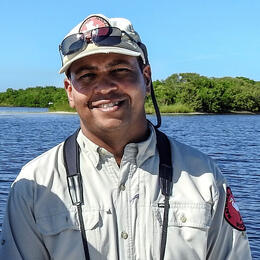Roseate Spoonbills in central Florida have chosen a unique nesting area. In 2014, Mosaic ceased mining operation at the Hooker’s Prairie site, beginning the reclamation process. In 2021, staff noticed spoonbill nesting activity in an adjacent, older mined area that has hosted a mixed wading bird colony in the past. Audubon visited the site and estimated 30-40 pairs of breeding Roseate Spoonbills!
“This would make the Hooker’s Prairie site one of the largest spoonbill breeding colonies in our region, second only to the Alafia Bank Bird Sanctuary,” explains Mark Rachal, Sanctuary Manager at the Audubon Florida Coastal Islands Sanctuaries.
Why are they nesting there?
“The site offers a unique situation where the birds can nest without fear of human disturbance,” Rachal continues, “In addition, the healthy population of alligators in the surrounding waters keep invading raccoons and other four-legged predators from raiding the nests. The birds can easily forage on the adjacent freshwater wetlands to feed the rapidly growing chicks. Once the chicks begin to fledge, they can learn to forage and supplement the food that adults are providing.”
The site is different than many of the coastal sites that Audubon normally monitors. At the coastal sites, the adult spoonbills can forage in saltwater and freshwater wetlands to feed their young. The birds at Hooker’s Prairie must rely on nearby freshwater wetlands to feed their families, which they appear to be doing with a high level of success.
Going forward, Audubon will partner with Mosaic to census the breeding birds at this site and document the nesting effort by the spoonbills and the many other wading birds that nest there.
Roseate spoonbills are listed by Florida Fish and Wildlife Conservation Commission as an Imperiled species and nesting sites such as these are vitally important for the recovery of these birds and achieving a stable nesting population in Florida.





